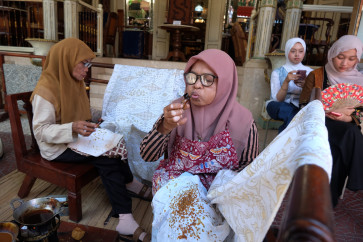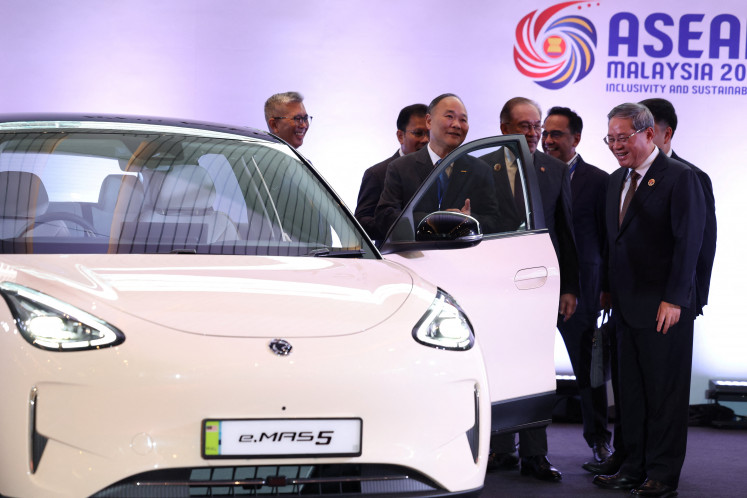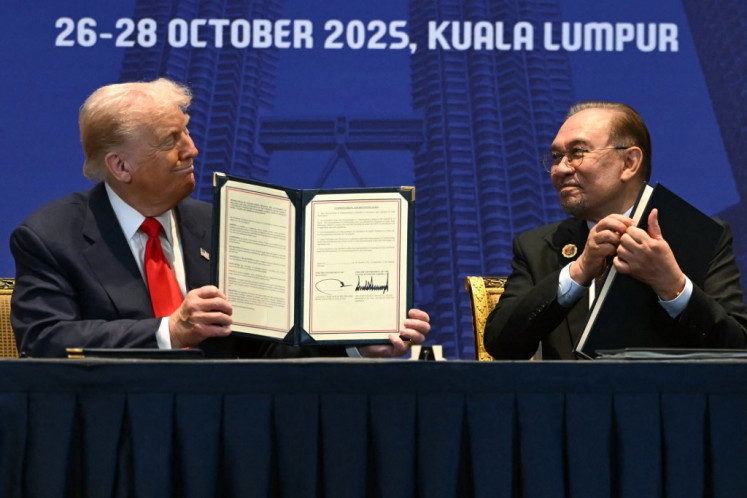Popular Reads
Top Results
Can't find what you're looking for?
View all search resultsPopular Reads
Top Results
Can't find what you're looking for?
View all search resultsE-shops improve distribution of staple foods
Support system: An e-warong on Jl
Change text size
Gift Premium Articles
to Anyone
S
span class="caption">Support system: An e-warong on Jl. Kecapi III in Meruya Selatan subdistrict, West Jakarta, opens for business. As part of the Social Affairs Ministry’s Family Hope Program, e-warong help distribute rice and sugar to participants of the program.(JP/Karina Maharani Tehusijarana)
The distribution of staple foods from the government has long been plagued with problems, ranging from hours-long waits and stock shortages to low food quality and the alleged misappropriation of funds.
To address these problems, the government has introduced as a form of assistance two cashless solutions: the Social Affairs Ministry’s Elektronik Warung Gotong Royong (e-warong) program and wholesale food store Jakgrosir, a collaboration between PD Pasar Jaya and the Jakarta administration.
The e-warong program, established to provide affordable staple foods for low-income families, replaces the government’s rice-for-the-poor (Raskin) program.
The term “e-warong” may evoke images of a modern, fully electronic store, but the reality is much more modest.
At first glance, a store on Jl. Kecapi III in South Meruya, West Jakarta, looks like a typical neighborhood corner stall, offering snacks, cigarettes and toiletries. However, an official banner hanging from its roof proclaims its name as the Prosperous Hope e-warong, while in the back, sacks of rice and sugar await pick-up by holders of the Prosperous Family Card (KKS), part of the Family Hope Program (PKH).
Disih Setianingsih, a 43-year-old mother of two, heads the 10-person committee in charge of this particular e-warong. Besides acting as ordinary shopkeepers, every month, Disih and her friends invite 200 or so KKS-holding families in the South Meruya subdistrict to the e-warung to receive the 20 kilograms of rice and 2 kg of sugar they are entitled to.
The red-and-white KKS works just like a debit card. Every month, KKS holders receive a deposit of Rp 220,000 each in their accounts for shopping at an e-warong. To serve those with KKS, Disih operates three electronic data capture (EDC) machines on which holders swipe their KKS and punch in their PINs.
When e-warong started operating in February 2016, many KKS holders who never had bank accounts had troubles with them. One elderly woman, hearing that holders were advised to keep their PIN secret, tore up a piece of paper with her PIN number on it before memorizing it. “Such an old person doesn’t understand things like this,” said Disih.
Despite the technical hitches, Marsan, 48, a Social Affairs Ministry representative who used to oversee the Raskin program in the district, said that the e-warong program was a definite improvement over Raskin. “Raskin rice was of very low quality,” he said. “And who knows where the money went.”
The government has lofty hopes for the program. Social Affairs Minister Khofifah Indar Parawansa said earlier this year that she was confident that the PKH was effective in fighting poverty and inequality. But there is still a ways to go.
Another banner on a wall next to Disih’s e-warong suggests that the shop offers bank account-opening services and displays pictures of cuts of meat and spices. But these services and goods are not yet available at the e-warong.
A big freezer sits in the back of the shop. Disih said she bought it because officials told her that the Agriculture Ministry would supply the e-warong with meat, vegetables and spices that could be sold to KKS holders. But, so far, the supply has yet to show up. “I use it to sell ice cubes,” she said.
About 25 kilometers away at the Kramat Jati Central Market complex in East Jakarta stands the newly opened Jakgrosir, similar to e-warong but much larger in scale.
Launched in early September 2017, Jakgrosir is a big-box store that serves as an integrated distribution center for subsidized staple foods for Jakarta Smart Card (KJP) holders.
Jakgrosir allows KJP holders to buy rice, eggs, beef and chicken at very low prices. For instance, a kg of beef at the store costs Rp 35,000 (US$2.59), compared to the regular price of Rp 110,000 — 120,000 per kg.
KJP holder Dewi Ruswati, 38, a single mother of two, was among the shoppers in the large, air-conditioned store on a recent Saturday morning. She strolled from one aisle to another, pushing her trolley containing a sack of rice and bags of beef and chicken.
“I used to buy [staple foods] at Inpres markets, but KJP holders had to line up for hours there,” she said, adding that the more modern Jakgrosir building was a lot more comfortable. “Everything is better-organized here.”
Meanwhile, Avila, 48, another KJP holder, said that she knew where to go to spend her non-cash social assistance wisely.
“If I received cash, I would probably spend it somewhere for unnecessary things,” she said. “But with the non-cash fund, I can spend it here to buy basic necessities for my household.”
Cardholders also shop at Jakmart, a mini-market version of Jakgrosir located in seven spots across Jakarta.
PD Pasar Jaya spokesperson Amanda Gita Dinanjar said that, in the near future, five additional divisions in Jakarta would have a Jakgrosir branch.










